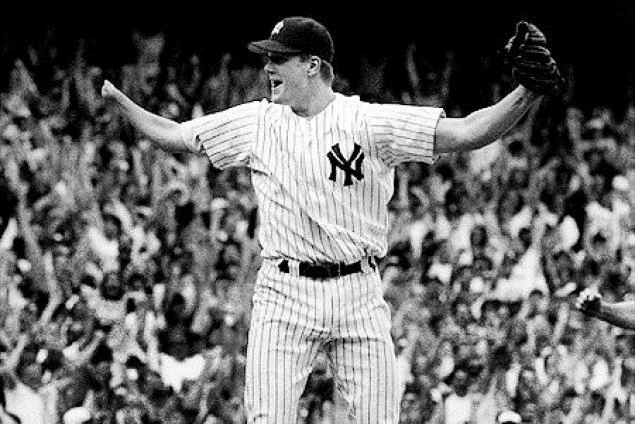
The New York Yankees have had some amazing pitchers over the years. However, major League Baseball has only one baseball player like Jim Abbott. Not only did he have a no-hitter, but he did it with only one hand. This month is the 28th anniversary of that September 4, 1993 feat the put him in the history books forever.
In the last 28 years since Abbott’s no-no, there have been only 4 no-hitters, all by pitchers with two hands. Dwight Gooden (1996), David Wells (1998 perfect), David Cone (1999 perfect), and the final one this year by Corey Kluber on May 19, 2021.
Jim Abbott’s Major League career lasted a decade. It began in California and ended in Milwaukee. Along the way, he totaled 87 wins, a 4.25 ERA, 888 strikeouts, and a no-hitter. He began his journey as a rookie for the Angels in 1989, tossed that no-no as a member of the Yankees, continued to beat the odds with the White Sox. Then, for a curtain call, he tallied both his career hits and knocked in all three of his career RBIs as a member of the ’99 Milwaukee Brewers roughly a month before his remarkable career ended.
His signature moment in baseball came during the 1989 season when he had a no-hitter with the Yankees, but that was not what made him remarkable. He is the only pitcher in the history of baseball to have only one hand. Most pitchers only dream of throwing a no-hitter; Jim Abbott did it and with only one hand. Abbott, a southpaw, was born in Flint, Michigan, in 1967. His left arm was longer than his right, which ended in a wrist that resembled a balled-up fist to which no fingers were attached. He became more aware of the limb difference in grade school when he endured teasing on the playground and awkward glances in class. Undaunted, he was thrilled when his dad bought him his first glove—a cheap plastic one from the drug store, but still, a baseball glove. Father and son set about playing catch, with a bit of problem-solving involved.
When Jim began school, he was fitted with a mechanical hand made of fiberglass and metal. But he hated the prosthesis, which he called a “hook,†because it frightened some of his classmates and made him self-conscious. Eventually, his parents stopped making him wear it. At 11, Jim joined a Little League team and threw a no-hitter in the first game he pitched. Despite his early success, most people figured the competition would soon pass him by. In fact, at every step, from Little League on, he kept hearing that his playing days would probably end at that level. But at each new level, Jim proved his doubters wrong. When he entered high school at Flint Central, his new coach doubted Jim would defend his position adequately. But Jim actually fielded well enough to play first base and the outfield when he wasn’t pitching.
As a sophomore pitcher for the University of Michigan in 1987, he was named the best amateur athlete and the top amateur baseball player in the nation. He became the first U.S. pitcher to beat the Cuban national team in Cuba in 25 years. As a junior, he garnered a gold medal as a 1988 U.S. Olympic baseball team member, crowning his amateur career by beating Japan in the final game in Seoul, South Korea. In his first season in professional baseball, he won a spot in the starting rotation of the pennant-contending Angels. He was not only the only major leaguer with a major disability, but Abbott never spent a day in the minor leagues.
In December 1992, Abbott was traded to the New York Yankees for three minor-league prospects when the Angels couldn’t sign him to a long-term agreement. The Yankees, who hadn’t participated in a postseason game in more than a decade, were hungry for a pennant going into the 1993 season. However, Abbott’s time with the Yankees would be frustrating as he was often the butt of George Steinbrenner’s scorn. During his time with the New York Yankees, Abbott was only mediocre as a pitcher, and as Abbott spent a lot of time working with disabled children and his charities, Steinbrenner thought he should be 100% focused on baseball.
On September 4, 1993, the New York Yankee Stadium fans were treated to one of the most awe-inspiring triumphs in sports history. Abbott bested a potent Indians lineup that featured Kenny Lofton, Carlos Baerga, Albert Belle, and Manny Ramirez and surrendered no hits over nine historic innings. His masterpiece remains an inspiration today as the only no-hitter by a one-hander.
There will never be another Jim Abbott. This unlikely sports hero was an Olympic medalist, a member of the no-hitter club, and a (mostly) effective professional athlete for a decade. But, metaphorically speaking, he accomplished all these amazing things with one hand tied behind his back. And he saved his last great baseball moment for the Milwaukee Brewers.
In 1999 Abbott joined the Brewers of the National League. Abbott would now be required to hit as well as pitch. On June 15th of the year, he would be ninth in the lineup. On the pitcher’s first pitch to him, he would blast a line drive to center to drive in a run—just another amazing accomplishment from an amazing man. In baseball, there are lefties and righties, but only one one-hander.
The great Jim Abbott, for his major-league career, Jim Abbott won 87 games and lost 108 with a 4.25 earned run average. Yet, he had as much impact as any player who played the game, giving renewed hope to thousands with disabilities. He once estimated that he had at least one scheduled meeting with a disabled child during every road series of his career. He today still is a speaker and advocate for the disabled, particularly children.
https://www.youtube.com/watch?v=_Gda6XZDx6c